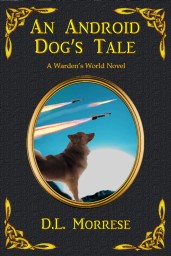My Self Publishing Adventure – Episode Three. Building a platform
Posted by Dave
 It’s been about a month now since I published my first two novels as separate ebooks and my self publishing adventure so far has been a rougher journey than I expected. I naively started out thinking my main focus would be on writing fictional stories to entertain and enlighten the masses, or at least a select subset of the masses. Oh what a simple, idealistic fool I was. Almost every day I find out something else I need to learn to be a self published or “indie” author.
It’s been about a month now since I published my first two novels as separate ebooks and my self publishing adventure so far has been a rougher journey than I expected. I naively started out thinking my main focus would be on writing fictional stories to entertain and enlighten the masses, or at least a select subset of the masses. Oh what a simple, idealistic fool I was. Almost every day I find out something else I need to learn to be a self published or “indie” author.
The first not totally unexpected bump in the road was cover design, which required considerable research and several false starts and experiments with unfamiliar software before I came up with anything I thought was even marginally acceptable. But this turned out to be a comparatively minor obstacle. Today I want to focus on a major detour on my self publishing adventure, my “platform.”
So what is a platform, you might ask. I know I did when I first heard the word earlier this year. Roughly speaking, in today’s digital age it is your social media presence, which leads to name recognition among readers, writers, reviewers, agents, and publishers. Someone with a good platform will be a person these kinds of people have heard of.
This came as something of a surprise to me. I was under the impression that name recognition for a writer came from writing extraordinary books. Not so or at least not at first. Yes, writing extraordinary books is still part of it but if you want those books to be read by anyone, you have to have a platform to attract those initial readers. This sounds like a Catch-22 situation. Unless you are already famous for something else, how does a new writer build one of these platforms?
I was going to compare this dilemma to using your head to bang a rubber spike through several layers of concrete but that might me easier. It’s certainly more straightforward. A writer’s platform is a tenuous thing and there seems to be no clear formula for making a successful one. I’m going to share what I think I’ve learned about them though and what I’m trying. It may be of some help to others who are on similar adventures.
The organizer of my writers’ group told me that the first thing I needed to create a platform was a Twitter account. She told me this at the first meeting I attended before it even started so she must have thought it was both basic and essential. I went home that night and opened one.
Apparently I also needed a Facebook account. I was pretty sure I already had one of those but I’d never actually posted anything to it. I checked and I did have one. Okay, two down. I was building a platform. This didn’t seem terribly difficult so far.
The third mandatory thing for all new writers is a website and a blog. I know a lot of people consider these the same thing but I separate them in my mind. I think of the website as the relatively static pages about you and your writing and the blog as the collection of posts on other things you’ve chosen to write about. The website is the part that lets people know about your books and the blog part is what they actually come to see. But however you want to think of it, you need one. You’re reading mine now. Thrilling, isn’t it?
Still, not too bad. A week after my first writers’ group meeting, I had the three legs of my platform done. All I had to do now was, well, to be honest, I didn’t have a clue.
I quickly found out that just having accounts with Twitter and Facebook, and a website did not mean I had a platform. These were just the foundation of a platform. To have a real platform you have to have a following.
Building a following requires two things that sound simple in theory but in practice are fairly difficult. The first is to provide content. Now I knew what content was. At least I thought I did. It’s the stuff you read on web pages. It’s the articles in newspapers and magazines, either paper or online. That doesn’t sound all that hard. I am a writer after all. Sure, I’d rather be writing my next novel but how long can a few blog posts, tweets, and Facebook status updates take?
The answer is forever because you have to keep writing them. You have to keep posting interesting, helpful, or insightful new content. But that’s not all. You’re still unknown, remember? You now have the best content available on the web but no one knows it’s there.
Now comes the even more difficult part of building your platform, the social part of social media. You may have noticed that everything I’ve mentioned up until now is a relatively solitary effort, not unlike what you do when you write your books. You sit at your desk and bang your fingers (or your head) on the keyboard until coherent thoughts trickle out and beautiful words magically appear on the screen. And if all you want to do is write books, that’s enough. But if you’re an indie author and you want people to read those beautiful words, it’s not. You have to go where the people are and, uncomfortable as it may be for introverted writers, you have to engage with them.
“Wait,” you say. “Haven’t I already done that? I have great content available on the internet and millions of people engage with that every day.”
Yes they do. That’s the problem. Millions of people use the internet every day to find things. Millions also provide things to find. Do you see the problem? Your great content is mixed in with a bunch of other content and some of that might be almost equally as great as yours. Sure, your website may get a few hits from time to time and someone my retweet something you wrote on Twitter, but passively sitting back hoping people will notice you is probably not going to gain you much of a platform during your lifetime no matter how clever your content is. You need to draw people to your site. You need to engage them directly one on one, but it doesn’t need to be face to face.
There are a number of places online for people who love to read and write, including Goodreads, Library Thing, MobileRead, Shelfari, and Book Country. These are sites I know of that include groups, forums and/or discussions relevant to reading and writing fiction. There may be many more. You need to establish accounts with at least a few sites like these, join groups, and monitor their discussions. When you have the feel for what they are about, you need to join in, discuss topics, share your experiences or ask questions. Always respond to anyone who asks for help if you have something to offer. These are not necessarily places to promote your books, at least not directly. Think of them more as meet and greet sites. Occasionally a topic may come up that you just wrote a brilliant blog about. In cases like that, you can say so and provide a link.
Sometimes you will find yourself looking at other people’s blogs and Facebook pages. This is also a socializing opportunity. If you have something to share or ask, do so by submitting a comment to their post.
Respond to tweets. If someone tweets a question you can answer, answer it. If someone retweets one of your messages or follows you, thank them.
I have just begun this process of one on one engagement myself and I have not yet established a profile with all of the sites I mentioned above but my experience so far has been positive. It hasn’t increased my book sales as far as I can tell but I am getting more blog hits and Twitter followers and I’m learning a lot of new things.
I assume book sales will follow in the future. This is still speculative on my part, of course. I’m apparently not at the people-actually-buying-my-books stage yet but I do know that engaging with people directly can increase visits to your blog, either because of idle curiosity about who you are or to see a post you may have mentioned. While there, they may visit more of your website, the relatively static pages where you talk about yourself and your books. They came to see your great blog content but they may notice your books and may be prompted to actually sample one.
My concept of how it should work goes something like this:
1- You join groups and forums, on reading, writing, and the genre or subjects you write about. For me, these would be science fiction, fantasy, and young adult books. You can do this either physically or online.
2 – You monitor what the people in those groups are talking about.
3 – You engage with the people you meet there. Share knowledge, experiences, and opinions.
4 – You respond to Tweets and/or Facebook status updates.
5 – Eventually someone visits your blog to see your great content on a subject he or she is interested in, or because you like the same author or book, or because they share the same opinion on some subject.
6 – They see your books. This is easier for them to do if your blog has a column listing them but as this is not a post on website design, a subject on which I am far from expert, I won’t go into that. To see what I mean though, look at the top right side of this page.
7 – They click on the book and either like the cover, the description, or the price and buy it.
8 – After they read it, they write a glowing review and tell all their friends about you.
9 – Those people write additional reviews and tell their friends.
10 – Repeat step 9 several hundred times and you have a platform.
You may have already seen the implications of platform building by now. It is a lot of work and it takes a lot of time. It’s also not something you can do once, complete, and move on. You have to devote time to your platform regularly, probably every day at first, time you would otherwise have to work on your next book. Some days you may find you simply don’t have time or are too exhausted to work on your book because of all the effort you have put in on your platform. This seems like another Catch-22 and it is the part of all of this I find most frustrating. I have books I want to write but I’d also like them to be read and they won’t be unless I take time away from writing them to build and maintain a platform.
Okay. Enough for that short rant. This is just the way things are. As indie writers we simply have to deal with it.
There is a plus side to platform building as well though. While you are engaging with people with whom you share common interests, you find yourself building online friendships. These people have many of the same goals, interests and frustrations as you do and just talking with them can make your job as a writer a lot less lonely than it otherwise could be. There is a community of writers and book lovers out there and it is a good community. I’m glad I joined it.
I was going to include statistics on how my sales and promotions were doing today but this post is already longer than I’d like it to be. I’ll provide updates on the numbers and my future plans in a future post.
In the meantime, if you’d like to share your experiences with platform building or have any suggestions on how to make the process less time consuming or painful, please leave a comment. Share your knowledge. We’re all in this together.
Related Posts:
Why I Chose To Self Publish
My Self Publishing Adventure – Episode One
My Self Publishing Adventure – Episode Two
My Self Publishing Adventure – Episode Three – Building a Platform
My Self Publishing Adventure – Episode Four – Managing Expectations
My Self Publishing Adventure – Episode Five – Gaining a Following
How To Create Covers For Ebooks
Ten Things For Aspiring Fiction Writers To Consider
About Dave
A reader and writer of speculative fiction. See my website for more information on me and my writing. https://dlmorrese.wordpress.com/Posted on October 14, 2011, in Self Publishing, Writing and tagged Author platform, indie writers, self publishing, social media, writing. Bookmark the permalink. 7 Comments.











Hi Dave
that was an insightful blog. i came across your site via the creative penn. i wanted to get a clear idea about branding and author’s platform and as you say it is a catch22. at least you’re doing it and even amidst your frustration you haven’t given up. i’ve had websites, blog(s), fb pages, and books for quite some time (almost a few years) and unfortunately everything i read was so daunting i didn’t do anything. simply because i didn’t want to make any mistakes and everyone one else’ s work seemed mildly intimidating. sometimes being a perfectionist works against you, but you know what? for some reason you’ve made me laugh and it is all coming into place. thank you. when you do what you’re called to do or what you’re truly passionate about, everyone & everything else connects. you find yourself walking and the path you seek appears with every step you take.
thank you
Terry
Hi there
Thanks for writing this post about your experience with platform building. I came across it from The Creative Penn website. I’ve just starting building a platform for myself in the past month. I agree, it does take awhile to get started and a lot of perseverance, and that’s before even sitting down to write a book!
Best of luck with your book sales in 2014!
This is Al Ellis again.
Probably a good idea about not posting sales numbers, although I did just that in a comment to one of your previous posts. Oh well….
Some good info about platform building here. I now have over 1,000 Twitter followers, and 3,000 plus Facebook friends. That’s a start.
And I do have a blog for my work-in-progress, Hollowpoint. It’s here: http://bit.ly/pbK7TW.
Let me know what you think.
Al
Thanks, A.C. Saw your blog. It looks pretty good. I like the idea of having a scene from one of your books up front like that. I have “free samples” but they’re not on the front page. Actually everything I have out so far is more of a beta version. My tastes in fiction don’t really follow the mainstream and I guess I wanted to test the waters to see if anyone other than me would like fiction in a style that falls somewhere between Douglas Adams, Terry Pratchett, and Eoin Colfer. I know my stuff is different. But I’ve gotten some nice comments and I’m springing for pro covers and edits for paperback publication next year. I’m not shooting for a bestseller, but I’d love to have a “cult classic.” 🙂
Thanks for the post. Interesting given I am probably a couple of months behind where you are on the publishing front but actually started building my network of fellow authors and contacting readers very early on. Just a note that I read a post recently about Amazon terms and conditions and you may breach these if posting too much information about sales figures. I might be wrong but I’d check it out first.
Thanks Andrew. I just read the clause I think you were referring to and I’m not sure it means I can’t disclose how many books I’ve sold but, to be on the safe side, I’ll probably stop posting numbers.
Pingback: Tag Surfing! Posts I liked: « Kate Policani